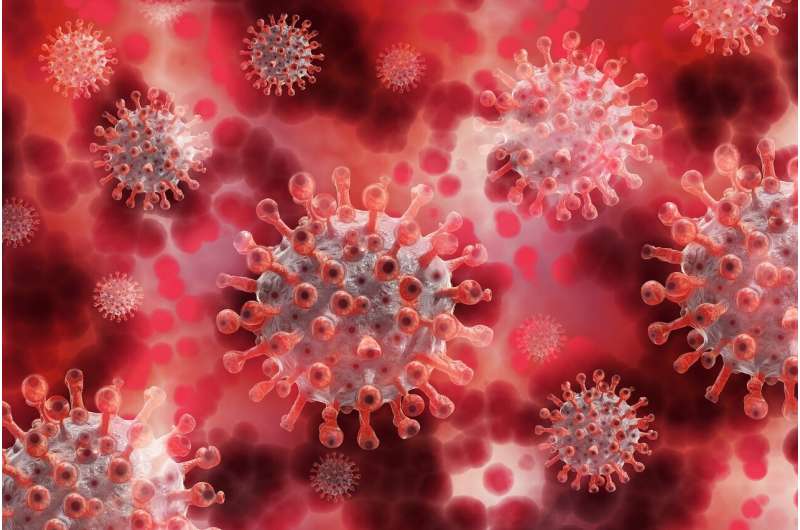Credit: Pixabay/CC0 Public Domain
Half of all COVID-19 patients with obstructive sleep apnoea require hospitalization. Moderate to severe sleep apnoea predisposes to severe COVID-19. In contrast, indications are that sleep apnoea does not predispose to COVID-19 infection. These are the key findings of recent research using Finnish FinnGen data, a project supported by the Academy of Finland Center of Excellence in Complex Disease Genetics (CoECDG).
The research was conducted by linking data from the National Infectious Disease Register in Finland on a COVID-19 diagnosis with other health data. On this basis the team identified 445 persons with COVID-19 infection, and 38 of them also had obstructive sleep apnoea. Patients with sleep apnoea had a three times higher risk for COVID-19 hospitalization than other persons infected with the coronavirus.
Half of all infections are asymptomatic
Many people who are infected with the coronavirus show no symptoms. This was established by the Academy-funded GeneRISK follow-up study, which involved more than 7,000 persons from Helsinki the capital of Finland and the Kotka region in South-Eastern Finland.
By the end of April, 2,987 participants in the GeneRISK study had completed the COVID-19 symptom questionnaire at least once, and 2,021 persons aged 50–70 had been tested for antibodies to the SARS-CoV2 virus. In the Helsinki metropolitan region, 2 percent of the samples showed antibodies and in the Kotka region one half a percent. Only every other person with antibodies reported having experienced COVID-19 symptoms. Data collection and antibody testing will continue through to the end of June.
Professor Samuli Ripatti from the Institute for Molecular Medicine Finland FIMM at the University of Helsinki is in charge of the research. "The COVID-19 pandemic has made clear the importance of both the genome of the virus and the genome of the infected person to susceptibility to infection and to disease severity. Careful analysis of the properties of the virus and its carriers and how they interact will help us prepare for possible future pandemics," Ripatti says.
He continues: "It was absolutely critical that the Academy and research foundations were able to react with such agility and provide targeted funding for researching the pandemic so that we can understand the reasons of the disease and how it affects people in Finland and Finnish society. The funding made available to the GeneRISK study allows us to use an existing rich set of health data for purposes of studying COVID-19 susceptibility and disease severity."
Risk of infection addressed by wide international consortium
Professor Ripatti is also involved in a wide international consortium led by the Institute for Molecular Medicine Finland FIMM. Scientists on the team have already identified a dozen or so areas in the human genome that are associated with higher susceptibility to infection with the virus or with severe COVID-19 illness. Among the genes associated with the risk of developing a severe form of the disease are those formerly linked with severe pulmonary diseases such as lung cancer and idiopathic lung fibrosis, and genes predisposing to autoimmune disease.
To date, more than 200 research projects and one thousand scientists have committed to joining the COVID-19 Host Genetics Initiative project, which is coordinated by FIMM Director Mark Daly and Group Leader Andrea Ganna. Finland is represented by two projects, FinnGen and GeneRISK.
More information: Satu Strausz et al, Sleep apnoea is a risk factor for severe COVID-19, BMJ Open Respiratory Research (2021). DOI: 10.1136/bmjresp-2020-000845
FinnGen Project: finngen.fi/en
Covid-19 Host Genetics Initiative: www.covid19hg.org
Provided by Academy of Finland
























